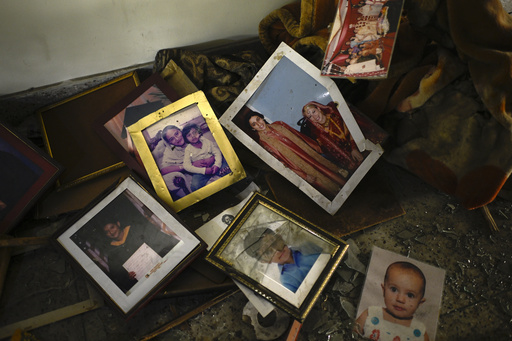
DHAKA, Bangladesh — The interim government of Bangladesh, led by Nobel Peace Prize winner Muhammad Yunus, announced on Friday its commitment to combat the rising incidents of vandalism and arson occurring nationwide. This move comes amid growing concerns from a significant opposition party and neighboring India regarding the attacks on a historic residence associated with former Prime Minister Sheikh Hasina, who was recently ousted from power.
Beginning Wednesday night, mobs have targeted supporters of Hasina, vandalizing homes and businesses across the country. Numerous properties belonging to former lawmakers, Cabinet officials, and leaders of the Awami League party, which Hasina once headed, have been ignited, appearing to be part of a systematic campaign against her legacy. One key site that has become a focal point is the childhood home of Sheikh Mujibur Rahman, Bangladesh’s independence leader and Hasina’s father, located in the capital city of Dhaka.
Sheikh Hasina took refuge in India on August 5 due to an uprising spearheaded by student movements that marked the end of her 15-year rule. On Friday, the Press Wing under Yunus issued a statement cautioning against continued violence, expressing the government’s intent to take decisive action.
“The interim government is deeply worried about various groups attempting to destroy and set fire to institutions and properties throughout the country. The government is prepared to address such acts harshly,” the statement noted. The government assured citizens of their commitment to safeguarding both lives and properties during this tumultuous time.
In a follow-up statement later in the day, Yunus called upon all citizens to swiftly restore law and order and prevent any further attacks on the properties of Hasina’s family and her supporters. This call for calm came over 24 hours after the assault on Rahman’s historic residence, which was declared a museum during Hasina’s regime. The unrest gained momentum following a day-long social media campaign inciting supporters to proceed toward the museum, which concluded with a violent clash as police stood by, unable to prevent the onslaught.
An intelligence source in Dhaka reported encountering approximately 70 separate attacks across Bangladesh since Wednesday, triggered by the earlier vandalism at Rahman’s former home. Reports emerged from the Daily Star, indicating that violence specifically targeting Hasina’s supporters occurred in at least 20 districts. Additionally, Channel 24 in Dhaka indicated violent incidents had been noted in at least 35 districts, including an attack on the village home of former President Abdul Hamid, a prominent figure in Hasina’s party.
There has been a noticeable escalation in targeted attacks since Hasina’s removal, with groups openly sharing their plans in advance and broadcasting their actions live via social media and mainstream television. Various reports suggest that at least 80 Islamic sufi shrines have also been vandalized, allegedly by extremist factions, highlighting a wider trend of violence. This spate of unrest aligns with allegations from minority rights organizations claiming that the interim government has failed to provide adequate protection, a narrative vigorously denied by authorities who contend that the unrest is politically motivated rather than ethnically driven.
In a statement released earlier on Friday, the Bangladesh Nationalist Party, led by former Prime Minister Khaleda Zia, urged Yunus’s administration to take effective measures to stabilize the situation, warning that failure to do so could result in widespread anarchy.
India, which played a critical role in Bangladesh’s liberation from Pakistan in 1971, condemned the attack on Rahman’s house in a statement on Thursday, referring to it as a site symbolizing “heroic resistance” and an integral aspect of Bangladesh’s national identity. It emphasized the significance of this residence in bolstering the collective national consciousness.
Political commentator Nazmul Ahsan Kalimullah expressed that such acts of violence could undermine the potential for a peaceful and democratic electoral transition. “The government’s apparent negligence in curbing these scenes of anarchy may escalate into more significant chaos. Such acts must not be overlooked,” he warned.
Yunus stated that a new election is expected to take place either in December or between then and June 2026, signaling an intention to restore democracy in the country amidst the ongoing unrest.

